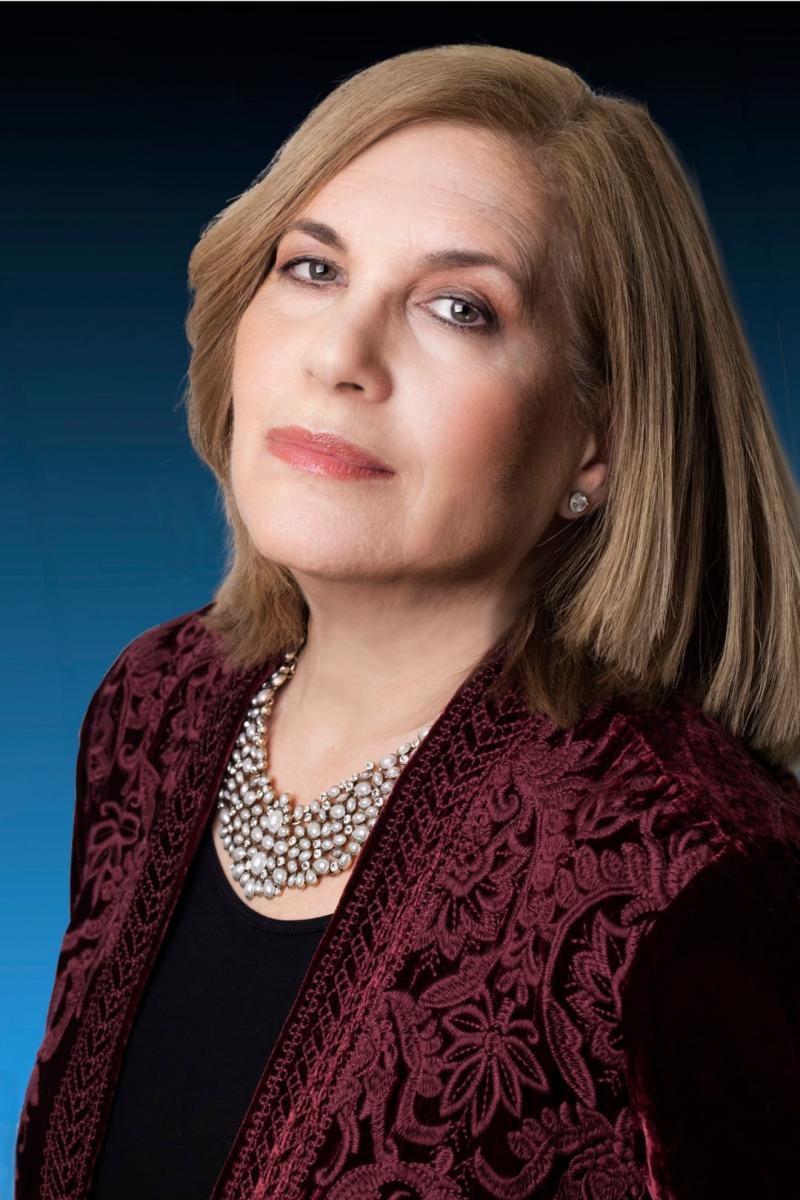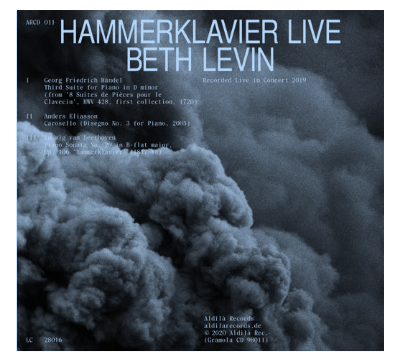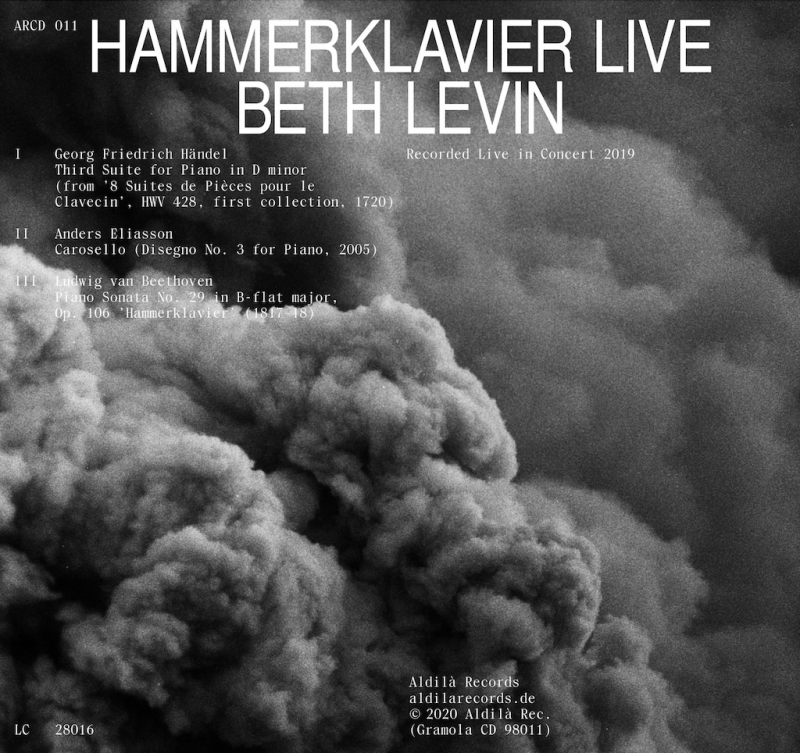HAMMERKLAVIER LIVE at Aldilà Records
Virtuoso Pianist Beth Levin’s Hammerklavier CD Celebrates Musical Giants

Beth Levin has become a household name among the most sophisticated aficionados as a dauntless performer of the most demanding piano repertoire, be it Romantic or contemporary. The Philadelphia native expresses her passion for chamber music as well as for solo piano works and is known for taking on challenges that push the envelope of her musical world.
Levin's latest CD, Hammerklavier Live, released in November 2020, was recorded at Festival Baltimore in Linehan Concert Hall in 2019. In this unique recording, Levin includes works of two of the greatest German masters, Beethoven and Händel, as well as contemporary Swedish composer Anders Eliasson.
Erica Miner: Congratulations, Beth, on this huge achievement, the release of your CD, Hammerklavier Live, in Beethoven's 250th Year.
Beth Levin: Thank you so much, Erica!
EM: How significant is it for you to share a birthday with the composer's baptismal day, December 17?
BL: Mostly it takes me back to lessons with my first teacher, Marian Filar, whose birthday also fell on December 17th. When I walked into the room to audition, clutching my music, we chatted briefly and realized our common birth date and that of Beethoven's baptism. It certainly broke the ice. I was accepted as his student and in the lessons that followed, he introduced me to my first Beethoven sonatas and sets of Variations. I studied the Beethoven third concerto with Filar and went on to perform it with the Philadelphia Orchestra.
EM: Sounds like your history with Beethoven started at an early age! Tell us about your Hammerklavier CD being part of a best-of-the-year playlist, BEETHOVEN ESSENZIELL (https://oe1.orf.at/programm/20201231/622151?fbclid=IwAR2JbulKmmyEImdupG7uI7Mt7UPYdfW35M1TmhiWaRKTMf3RKirprTmrVT4), in Vienna.
BL: I knew that the radio host in Vienna, Peter Kislinger, was a fan of the CD and loved the music of Anders Eliasson. Still, I was very surprised, not to mention honored and grateful, to be part of the special end-of-year playlist. It aired today and will be online for seven days.
EM: How has your background of having studied with iconic piano luminaries such as Rudolf Serkin prepared you for this recording?
BL: Rudolf Serkin and Leonard Shure were titans of the keyboard but more importantly great musicians who had Beethoven running through their veins. I think that I drank that in and was drawn to their sense of phrasing, long lines, structure and dynamics to name a few aspects of a performance. I was also affected by their sense of courage when making music and a searching quality that led them to unexpected places. The Hammerklavier requires a sense of adventure, an exploratory outlook rather than anything preconceived. Having had those powerful mentors was the right soil for me to grow as a musician and attempt something like the Hammerklavier sonata. Looking back, I'd say I was blessed with great teachers.

EM: Describe the ways in which Handel relates to Beethoven, vis-à-vis your pairing the "Halle master's" Suite No. 3 in d minor with the other works on this CD.
BL: Handel was Beethoven's role model. Beethoven had copied out Handel's Messiah the same way that a painter might copy an old master. I saw right away that the Suite in d minor was no polite form with a few dances. Handel was a virtuoso harpsichordist and had traveled widely. The Suite in his hands became very worldly and eventually grew to become Sonata form that propelled Beethoven to fame as a composer of piano music. The work is long, very bold with an improvised Fantasia-like quality. Generally speaking, it felt like a good opening because of its energy and panache.
EM: Indeed, the D minor suite sounds incredibly advanced and, with your adventurous and expansive approach and subtle rubati, very Beethovenian. Yet the precision of your trills sounds markedly Baroque. Aside from Beethoven and Händel, do you feel a special affinity for the "great German tradition" in your overall choice of repertoire?
BL: At the core I do but I'm also very happy when I receive a new work in the mail written yesterday. I think there is a link between playing and acting. We should be ready for any genre-Impressionism, Baroque, Classical-ready for any part to play. Often, we are portraying music--I'd say, expressing it to the audience--which requires a certain projection. Even when something is in the score, we need to express it so that it is alive. I really enjoy mixing the old and the new on programs, most recently Yehudi Wyner and Frank Brickle on a virtual recital with Beethoven and Chopin. The composer Andrew Rudin often jokes with me: "thanks for pairing me with the Schumann Symphonic Etudes!" But I think in the end a performance is by its nature "new" and the Hammerklavier is no exception.
EM: What for you are the special challenges of Beethoven's Hammerklavier?
BL: Its length for one thing. At times I found myself talking to myself in a performance as in: "You're coming around the bend, don't give up now!" The fugue is a huge challenge because when Beethoven is so radical and bold in his vision, the pianist also has to let go of convention and forget about safety. I hate to think that things are technically difficult, but I had to at least admit to myself that a few spots were on the edge of stability. Also, it's the kind of work that haunts you when you are away from the piano and consumes your life. I remember turning down projects pleading "I can't right now, I'm learning the Hammerklavier sonata." The scope of the piece is huge, and I think holding a movement together convincingly is difficult, not to mention the entire work. As with any project you should come to it with a sense of sacrifice and love. But in this case doubly so!
EM: How does contemporary Swedish composer Anders Eliasson's final piano piece, his 2005 Carosello (Disegno per pianoforte No. 3), fit in with the Beethoven and Handel works you've chosen for this recording?
BL: I feel that the Handel and the Eliasson pave the way for the Hammerklavier on the program. The Eliasson is in 5/4 and has a feeling of floating and never being quite grounded.
EM: Yes, for me it brings to mind some of Scriabin's more "otherworldly" works. You definitely mined that airy, ethereal quality in your interpretation.
BL: We also experience a timeless quality in Hammerklavier. Eliasson's sound world is utterly unique and "Carosello" exhibits in a compressed form some of the same qualities of Hammerklavier-building to a climax and then returning to start again. His music feels organic and natural to me, and Hammerklavier is a complete force of nature. On the one hand the Eliasson works as a contrast to the Beethoven, but in originality, harmonic color and emotion they match.
EM: What would you most like to convey to your listeners and fans with this particular recording project?

BL: The Handel Suite introduces the CD warmly and with such vigor and sense of dance. Eliasson starts to move away from a tonal center and prepares us a bit for the unknown.
A friend told me that he listened to the Hammerklavier while on a long car journey. That struck me as the perfect way to experience Op. 106.
EM: The Hammerklavier was undoubtedly the highlight of the CD. I especially admired, as I have in your previous recordings, the discreet contrasts between the more noble aspects of Beethoven's writing (as in the initial fanfare of the first movement Allegro) and the arrestingly chromatic progressions that follow.
BL: As a player I felt Beethoven was taking my hand and asking me to follow him not knowing exactly where we'd end up. I hope that listeners will experience the power of Op.106 but also the extreme tenderness and intimacy. I avoided the opening chords for a long time jumping straight to the singing line that follows the fanfare. I took a bit of a slower tempo in the first movement exactly because there is so much lyricism that I didn't want to gloss over in speed. A little less hammer and more klavier might have been my goal.
EM: And you achieved that goal throughout the rest of the piece. The lightness of the Scherzo; the profundity of the Adagio sostenuto, reminiscent of the composer's late string quartet slow movements; and the unbridled passion of the final Largo - Allegro risoluto. It's all there.
BL: I hope that my audience enjoys every minute!
EM: I have no doubt they will. I certainly did!
Hammerklavier Live can be purchased at: https://bit.ly/BethLevinHammerklavierLive
Recorded at Festival Baltimore, Linehan Concert Hall, University of Maryland, 29 June 2019 Recording Engineer: Alan Wonneberger Recording Producer: Peter Karl
Executive Producer: Christoph Schlüren
Design: Daily Dialogue (Maximilian Schachtner, Malin Schoenberg, Raphael Wicki)
Aldilà Records aldilarecords.de ©2020 Aldilà Records (Gramola CD 98011) LC 28016
Photo Credits: Tess Steinkolk (headshot), Maximilian Schachtner, Malin Schoenberg, Raphael Wicki (album cover)

Videos

